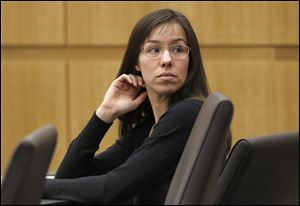
Defense set in gruesome Ariz. boyfriend slaying
1/28/2013
Jodi Arias appears for her trial in Maricopa County Superior court in Phoenix. Arias is charged with murder in the death of her boyfriend, Travis Alexander, and prosecution is seeking the death penalty.
PHOENIX — Jodi Arias was adamant at first. She said she knew nothing about her lover's death, didn't slit his throat, stab him nearly 30 times or put a bullet in his forehead.
Then she offered a different story: Masked intruders killed Travis Alexander and she escaped.
Arias finally settled on a third version: She had slain her abusive, on-again, off-again boyfriend in self-defense. It was kill or be killed, her attorneys told jurors during their opening statement at her ongoing trial.
However, her different stories will pose a formidable obstacle as those attorneys present their case beginning Tuesday in a Phoenix courtroom in the trial that has become a cable TV news sensation. A number of legal experts agree the primary goal for the defense will be to spare Arias the death penalty.
Brief questions posed by jurors through a judge to the lead detective as he testified could offer Arias some hope — maybe not for acquittal but possibly to avoid becoming just the fourth woman on Arizona's death row.
Did authorities check the alibis of Alexander's roommates? Yes. Were any knives missing from sets inside his home? No. Did police find Arias in possession of the gun used in the killing? No, none of the weapons have been recovered.
The questions were previously answered during the trial but might suggest jurors aren't so sure about the prosecution's case and the theory that it was a premeditated killing — a requirement for the death penalty.
All the defense has to do now is “feed the doubt,” California jury consultant Howard Varinsky said.
The trial began in early January with all the elements needed for big play in the tabloids. Prosecutors presented pictures of the 32-year-old defendant and the victim taken on the day of the killing — Arias nude on his bed, Alexander in the shower, then dead on the bathroom floor.
The couple's stormy courtship was replayed in court. They met in 2007 in Las Vegas. Alexander was a 30-year-old Mormon, motivational speaker and successful businessman, Arias an aspiring photographer. They dated for about five months. Arias lived in Southern California and would visit Alexander at his Mesa home.
His friends say Arias practically lived with Alexander, and that he became bothered by her possessiveness. When he broke it off, she stalked him for months, according to testimony.
She claims she ended the relationship after catching Alexander in too many lies. Still, she said she moved to Mesa at his urging after the breakup as the pair continued to have sex while he dated other women.
Arias told police that on the day of the killing, June 4, 2008, Alexander invited her to his home for sex then became enraged when she dropped his new camera while snapping photos of him. She claims she had to fight for her life.
The defense has yet to explain, however, why she put his camera and bedding in a washing machine, why she didn't call authorities; why she changed her story; and what happened to the weapons.
Alexander was shot in the head with a .25-caliber gun, the same caliber weapon that Arias’ grandparents reported stolen from their California home about a week before the killing. Arias had been staying with them when the weapon was taken, authorities said.
Prosecutors say she stabbed and slashed Alexander 27 times, slit his throat, then shot him in the head in a final salvo of rage. The sheer brutality of the attack contradicts her claim of self-defense, they contend.
Defense attorneys concede that she shot Alexander and say he kept fighting, forcing her to fend him off with a knife.
In an early police interrogation of Arias, she insisted she didn't kill Alexander.
“Jodi, tell me the truth, please,” Mesa police detective Esteban Flores said in the videotaped interrogation played for jurors. He noted her bloody palm print and hair were found at the scene along with the photographs that prove she was there.
“I did not kill Travis,” Arias replied.
However, she said if she were to have killed him, stabbing would have been too cruel.
“I don't think I could stab him. I think I would have to shoot him until he was dead if that were my intentions,” Arias told the detective. “If I had it in me to kill him, the least I could have done was make it as humane as possible.”
Now that defense attorneys have said Arias did shoot Alexander, the only question is which account jurors believe.
“The truth can always be somewhere in between,” said Laurie Levenson, a professor at Loyola Law School in Los Angeles and a former federal prosecutor.
Levenson said the defense will attempt to explain away everything.
In one scenario, Levenson said, defense lawyers could say Arias brought the gun from her grandparents’ house but only for protection if Alexander got abusive, not to kill him. They could say she changed her stories out of fear, thinking no one would believe her, and that she was in shock after the killing so she didn't call police.
“She just needs one, just one juror to have reasonable doubt,” Levenson said. “For the defense, it's going to be a victory if she doesn't end up with the death penalty.”